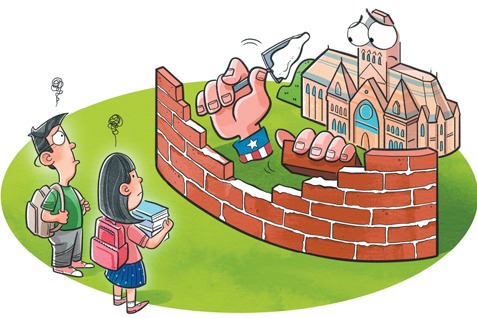Testing times


Japan's change of stance toward China is motivated by its need to focus on the real domestic challenge rather than a fabricated external threat
Japanese Foreign Minister Takeshi Iwaya visited China on Dec 25, 2024. This was the first official visit to China by a Japanese foreign minister since the start of April 2023. Both sides agreed to resume high-level economic and security dialogues, and a 10-point consensus was reached during a meeting of the China-Japan high-level consultation mechanism on people-to-people exchanges.
The visit came after Chinese President Xi Jinping held talks with Japanese Prime Minister Shigeru Ishiba during the APEC summit in Lima, Peru, in November 2024, the first meeting between the two leaders since Ishiba took office as prime minister over a month earlier. And in early November 2024, Takeo Akiba, Japanese national security adviser, visited China and held high-level political dialogues with Chinese Foreign Minister Wang Yi.
The series of engagements took place against the backdrop of Donald Trump's imminent return to the White House and the intensifying strategic competition between China and the United States.
Some of the US' allies in the Asia-Pacific region, such as Australia, have shown positive changes in their relations with China.
As the most important ally of the US in East Asia, Japan's rapid rapprochement with China is particularly noteworthy.
What is the driving force behind Japan seeking to enhance its relations with China? Is it sustainable? Many analysts suggest that the "Trump factor" is the primary cause of the change in Japan's stance toward China. During his campaign, Trump said he would impose not only a 60 percent tariff on China, but also tariffs of up to 20 percent on Japan and other allies. This change can be seen as a microcosm of the evolution of strategic thinking among the US' allies.
First, the new Trump administration will initiate and accelerate the cognitive awakening of the US' allies, including Japan, that their primary challenge comes from within, specifically from the decline in their economic competitiveness, rather than external military threats. Last year was a major election year for many of the US' allies. In the United Kingdom, the Conservative Party was voted out of office, ending its 14 consecutive years of rule. In France, the ruling party alliance lost one-third of its seats in the parliamentary elections, leaving it at a disadvantage in the parliament. In September, far-right parties won in local elections in three eastern German states, and in mid-December, German Chancellor Olaf Scholz lost a vote of confidence in the Bundestag, leading to early elections in February. The current three-party coalition government in Germany is accelerating its fragmentation, and the political situation there is becoming increasingly unpredictable. Japan's Liberal Democratic Party managed to retain its ruling position, but failed to secure a majority in the parliament, resulting in a minority Cabinet for the Ishiba administration.
The root reason for the defeat of the ruling parties in the countries mentioned above lies in public disappointment and anger at domestic politics. A surge in living costs caused by high inflation rates has become the main challenge faced by the developed economies. In 2022, after Liz Truss took office as the UK prime minister, she implemented aggressive stimulus policies such as substantial tax cuts and central bank interest rate hikes, which led to worsening inflation and the dumping of government bonds, making her the shortest-serving prime minister ever. Similarly, a public opinion poll conducted in Japan after the October 2024 election showed that more than half of the voters identified the economy and countermeasures against high prices as their top concerns. At the same time, as the electric car industry has grown rapidly, the core of competition in the automotive market has shifted from engines to software, including artificial intelligence, and Japan's traditional competitive advantages are diminishing rapidly. The substantial devaluation of the yen over the past two years is essentially a reflection of the weakening competitiveness of the Japanese economy.
Second, a significant increase in military spending cannot solve the biggest challenges faced by the US' allies, including Japan, and the inherent need for rational allocation of prioritized resources has mobilized their willingness and motivation to improve relations with China and build a favorable surrounding environment. Taking Japan as an example, in recent years, it has defined China as an unprecedented strategic challenge or even a threat over a period of time, so it enhanced its defense capabilities and strengthened its military alliance with the US.At the end of 2022, Japan announced its intention to outlay a total of 43 trillion yen ($272 billion) on national defense from 2023 to 2027, bringing defense spending to 2 percent of the GDP in fiscal 2027. On Dec 27, 2024, the Japanese Cabinet approved a record 115.5 trillion yen draft budget for fiscal 2025, with the rising expenditures for social security and national defense as the main reasons for the increase. Among the amount, the medical and social security expenses go up to 38.3 trillion yen, and defense spending reaches 8.7 trillion yen, both setting new records.
Considering the substantial depreciation of the yen, the costs of purchasing and maintaining expensive US-made military equipment will continue to rise. According to the Japanese government estimates, the country's economic growth rate for 2025 is projected to be just 1.2 percent, making it difficult to sustain the big surge in military spending. Additionally, with the Bank of Japan beginning to raise interest rates, the annual cost of repaying the principal and interest on government bonds will also spike.
Healthcare, pensions and the principal and interest of national debt are already straining the budget. If defense spending continues to rise without restraint, Japan's investment in technological research and development will be reduced, and its economic competitiveness will be further weakened. Japan must allocate its limited resources to areas where they are truly needed, and its military expenditures must be kept within a rational range. This requires Japan to improve its international relations in the surrounding areas to extricate itself from this dilemma, and the core of this extrication is to reconstruct its perception and discourse regarding China.
Although Japan's positive shift in diplomacy toward China has its internal stimulus and inherent momentum, there are still uncertainties and reversibility in the aforementioned trends. First, if Trump exerts ultra-high pressure on China after taking office, and urges core US allies such as Japan to take sides, it is yet to be observed whether Japan can withstand the test. Second, the domestic and intra-party political foundations of the Ishiba administration are unstable, and it is still unclear whether domestic political struggles will lead to a drift in Japan's strategic cognition and direction.
However, the general enhancement and positive signals in China-Japan relations may not change in the long term. This is essentially determined by the main driving force of the new era of international relations represented by China and the strategic posture of the Global South's collective rise. It is important to adhere to the direction of comprehensively advancing the China-Japan strategic and mutually beneficial relationship, as agreed upon by the two leaders, and actively build the bilateral ties that are constructive and stable, in line with the requirements of the new era. Reshaping their strategic relationship will also provide important references and experience for China in dealing with its relations with other US allies.
The author is a professor of the School of International Studies at Nanjing University. The author contributed this article to China Watch, a think tank powered by China Daily.
The views do not necessarily reflect those of China Daily.
Contact the editor at editor@chinawatch.cn.


































